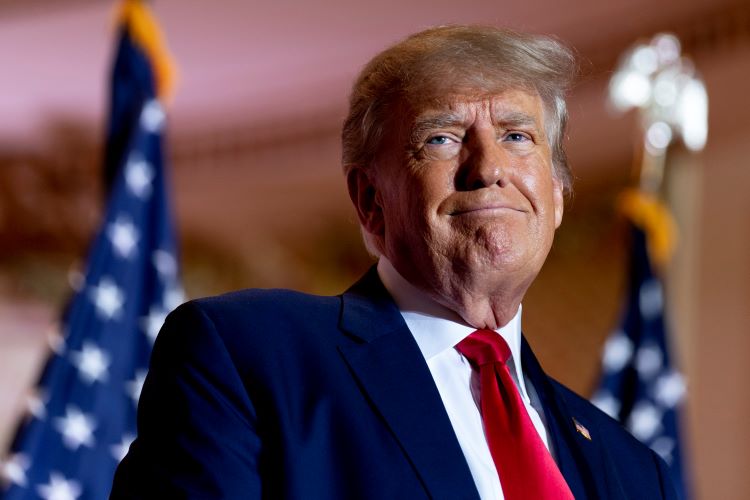Selective-prosecution argument in Trump falsified-records case is 'long shot' that may still resonate

Former President Donald Trump in Palm Beach, Florida, in November 2022. Photo by Andrew Harnik/The Associated Press.
Former President Donald Trump may argue that any forthcoming indictment in connection with hush-money payments to an adult film actress is a selective prosecution entitling him to dismissal of the charges.
But it is unlikely to work, according to experts interviewed by the New York Times and Law.com and an op-ed in the New York Times.
Selective-prosecution claims are grounded in the equal protection clause of the 14th Amendment, according to an article by Evan T. Barr published in September 2022 in the New York Law Journal. Barr was a partner at Fried, Frank, Harris, Shriver & Jacobson when the article was written, but he joined Reed Smith in February.
The U.S. Supreme Court referred to the equal protection argument in Yick Wo v. Hopkins. In that case, the Supreme Court struck down a San Francisco ordinance that required laundries to operate in buildings made of brick or stone—unless the owners got permission. Most Chinese nationals operated laundromats in wooden buildings, and none was able to obtain the required permit. Others, however, did receive permits for wooden-building operations.
Several Trump-affiliated defendants have raised selective-prosecution claims, but none has succeeded.
In the case of Trump, Manhattan District Attorney Alvin Bragg in New York is likely to bring charges under a state law banning the falsification of business records. In the alleged scheme that resulted in federal charges against Trump’s lawyer Michael Cohen, Cohen paid $130,000 in hush money to adult film actress Stormy Daniels and was reimbursed by Trump, prosecutors said. Daniels has alleged that she had a sexual encounter with Trump, which he has denied.
The reimbursement was characterized as legal fees to cover up the true nature of the agreement, and the money was not reported as a federal contribution boosting Trump’s campaign, according to the allegations.
Cohen later pleaded guilty to campaign finance violations in connection with the payments.
Under the state law, falsifying business records is a felony if it is done to aid or cover up another crime, according to the New York Times op-ed. Other violations would be misdemeanors.
To win a selective-prosecution claim, Barr wrote for the New York Law Journal, a defendant must establish:
1. Other similarly situated defendants are not prosecuted.
2. The discrimination is intentional.
3. The discrimination was based on an arbitrary or invidious classification, such as race, religion, national origin or the exercise of free speech.
The New York business-records law has often been used when a defendant falsifies records to cover up a crime, according to the op-ed by Ryan Goodman and Andrew Weissmann, professors at the New York University School of Law.
They cited a study, published at Just Security, which shows that the law has been used to charge a teacher who submitted a fake COVID-19 vaccine card, an auto repair shop owner who didn’t file proper tax forms, and a woman who fraudulently obtained a store credit card to buy merchandise at a Lord & Taylor department store.
In Trump’s case, paying hush money isn’t illegal—standing alone. But it may be argued that the false record furthered tax fraud in that extra money was paid to Cohen to cover his taxes, Goodman and Weissmann wrote. And it may have have furthered a failure to report the payment as a campaign contribution, they said.
In their view, the case is not a selective prosecution “by a long shot.”
One expert who spoke with the New York Times, Angela J. Davis, a professor at the American University Washington College of Law, agreed that a selective-prosecution argument is unlikely to succeed.
“Selective prosecution is a really difficult thing to prove,” Davis said. “It’s very difficult to show that similarly situated people could have been prosecuted but were not.”
Marc Agnifilo, a white-collar defense attorney, agreed in an interview with Law.com.
“I don’t think you can beat the drum of selective prosecution,” Agnifilo said. “I think juries do that on their own. Selective prosecution all tumbles back into the quality of the evidence. If the evidence is of poor quality, the jury will see that.”
The effect on potential jurors is one reason why defense lawyers may want to seek dismissal for selective prosecution, Barr wrote in the New York Law Journal.
“To the extent the claim gets airtime, it can impact the community from which a jury will ultimately be drawn,” Barr wrote.
A selective-prosecution claim can also help raise money and can affect the judge, who may be more willing to give a break in sentencing or to allow the defense to obtain more information on the government investigation.
Paul Rosenzweig, a former prosecutor in the independent counsel investigation of former President Bill Clinton, also sees a benefit to the claim in a business-records prosecution.
“This has a bit of the Al Capone-y feel to it—where they got him on the tax evasion because they couldn’t get him on murder—which is acceptable if and only if you are convinced of the fundamental criminality of Al Capone,” Rosenzweig told the New York Times. “I accept that as to Trump, but tens of millions don’t.”



